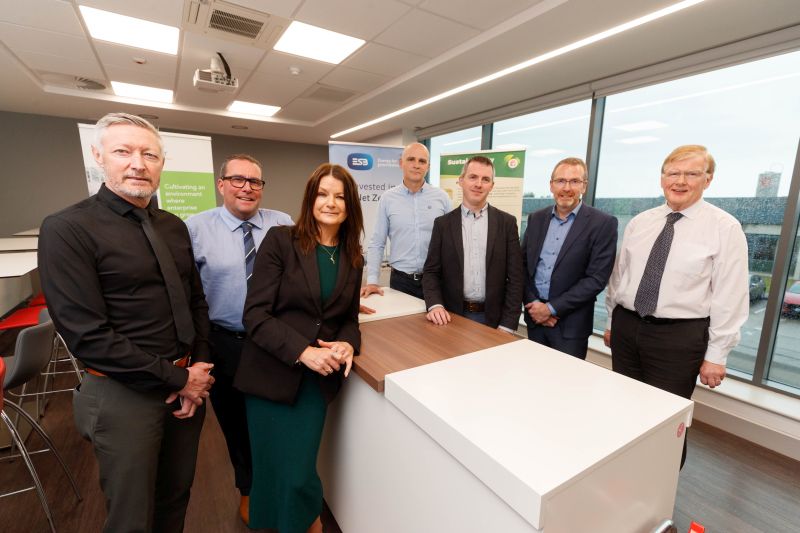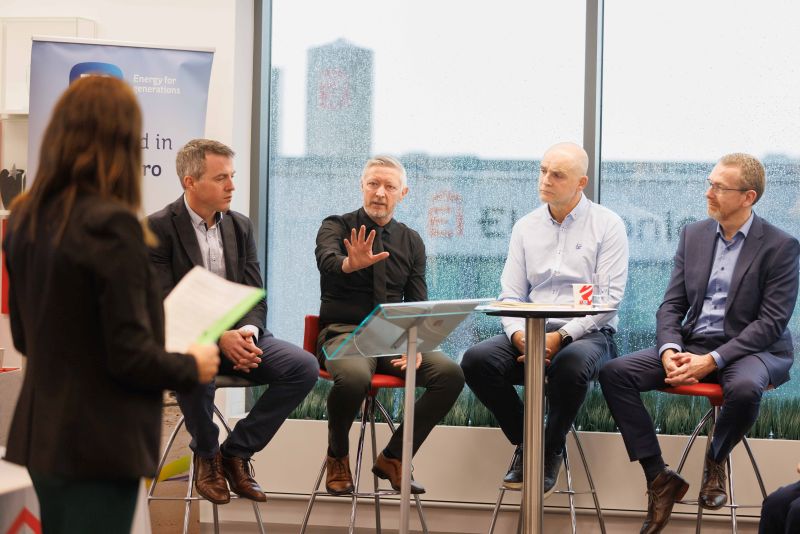
Opening event in Mid-West Sustainability Week demonstrates companies’ commitment to reducing carbon footprint
Helen Downes, CEO, Shannon Chamber, pictured at the launch of Mid-West Sustainability Week held in Ei Electronics’ Centre of Excellence with (from left): David Keating and Peter Murphy, Ei Electronics; Evan Lawless, Chemifloc Group; Martin Cosgrove, Aerogen; Sean Hegarty, ESB Generation & Trading; and Jim Duignan, Ei Electronics. Photo by Eamon Ward.
Shannon Chamber’s Mid-West Sustainability Network may be in its infancy, having been established in early 2023, but the strides its member companies are making to reduce their carbon emissions are impressive.
Three member companies, Aerogen, Chemifloc Group and Ei Electronics took to the stage at the opening event in Sustainability Week, giving comprehensive presentations on the work they are doing to attain net zero. The first event in this information-packed week was held in Ei Electronics’ Centre of Excellence in Shannon. The Week was officially opened by ESB’s Sean Hegarty, Net Zero Transition Manager, ESB Generation & Trading.
Getting the ‘Week’ underway, on the same day as ESB placed its new Hydrogen Power Unit at Shannon Airport Business Park, Mr Hegarty said that ESB was delighted to support Shannon Chamber in delivering a week with such a strong focus on sustainability.
“It matches our commitment to playing a full role in building a resilient electricity system where carbon-free energy will displace carbon emissions in how we power buildings and transport. We are putting in place the infrastructure and services to enable our customers and broader society to live more sustainably. We are balancing this with the imperative to maintain reliable and affordable electricity supplies to support customers, communities, and our economy.”
Referring to biodiversity, Mr Hegarty said that nature is in crisis due to man-made causes.
“One-third of our wild bee species is threatened with extinction; it’s a ‘slow moving’ crisis. Doing no significant harm is no longer enough; businesses are expected to be net positive.”
Aerogen, a world leader in acute care aerosol drug delivery, employing 500 people in Ireland, 300 or whom are in Shannon, adopts an employee-driven approach to sustainability, which is producing results, as its senior facilities specialist, Martin Cosgrove pointed out.
“We saved 33,000 kWh/mth in energy projects undertaken in 2023. We eliminated ‘just-in-case’ components which enabled us to reduce waste by 34 tons and we reduced our packaging foam. Our packaging is now FSC certified which means that all materials used come from responsibly managed, FSC-certified forests,” he said.
Other gains attained to date include recycling rates of over 90% at both its Parkmore and Shannon plants, equivalent to saving 3,154 trees, 331 tons of CO2, or taking 89 vehicles off the road. Plans for 2024 are equally ambitious and include replacing gas heating with air handling units, upgrading the roof at its Shannon facility, and attaining ISO 14001 accreditation.
“Embedding sustainability at our core demonstrates that we care, not only for our customers, patients and employees, but also for our community, our suppliers and for the broader world we live in,” stated Mr Cosgrove.
Evan Lawless, director of sustainability and logistics at Chemifloc Group, a company that develops the chemistry that delivers clean water, safe food and some of life’s essential products, said that as a chemical manufacturing facility, the company inherently faces the challenge of maintaining an environmental balance.
Its logistics and distribution division, with a fleet delivering significant quantities across the country to over 1,700 customers sites, contributes to the company’s overall emissions but, through using hydrotreated vegetable oil, and optimising routes to reduce emissions, it is addressing these challenges.
With key objectives set to 2030 that include achieving a 20% reduction in transportation emissions, and being net zero at operational levels, it is not surprising that initiatives planned include using HVO or alternative fuel, installing heat exchangers and solar panels, and putting a focus water conservation and rainwater harvesting.
Chemifloc has sustainability champions in place throughout the business to ensure that sustainability remains a core focus. These champions serve as advocates, providing a dedicated voice for sustainability in every area of its operations. Sustainability is integrated into corporate strategy, with key metrics set for all areas of the business, ensuring a continual focus on sustainability.
David Keating, Director, Plant and Manufacturing Technology, Ei Electronics, is all too familiar with the necessity to save our planet having successfully reached the summit of Mount Everest in May. He took a product and process approach to demonstrating the changes Ei Electronics is making to reduce its carbon emissions.
He outlined the gains made from redesigning one product in the company’s product line, through reducing the number of individual parts from 34 to 9.
“This delivered substantial reductions in production and assembly. Power consumption has been reduced by 60%; 20% less energy is used in manufacture; the plastic used in the product has been reduced by 15%; labels have been removed from the product resulting is 2000kg of paper saved per annum. The product is designed for recyclability – printed circuit board, battery, plastic – and it is Eco packaged, using recycled cardboard packaging.”
Commenting on the company’s new 10,000 sq. metre facility in Shannon, Mr. Keating stated that it is the first nearly zero energy building (nZEB) in Shannon, is “A” rated, and has 2,000 solar panels installed which deliver 6% of power to Ei’s campus. In addition, 90% of site lighting has been converted to Eco-LED lighting, and 80% of site toilets use harvested rainwater for flushing.
Ei Electronics is not just a market leader in home life safety solutions but has now taken its rightful place as the first alarm manufacturer to provide a full circle economy cycle on its product, have set up a take-back and recycle scheme in Germany. Using a certified recycling operator, its alarms are disassembled and separated into different waste streams.
“The plastic parts are ground down to form powder or granules and then used to produce other plastic products. The printed circuit boards are melted down; the metals are extracted for reuse; and the batteries are professionally disposed of through a certified service provider in line with regulations for battery disposal. We also employ people with certain disabilities at this recycling facility, providing them with useful work and enhancing community involvement, all part of our CSR pledge to the communities in which we operate,” added Mr Keating.
Clearly impressed with how Sustainability Week kicked off, Shannon Chamber CEO Helen Downes said it was but the start of a week where companies throughout the region would learn from each other, take new ideas on board and at the end of the week, pledge to return in 2025 with their own case studies of sustainability initiatives’ roll-out.

Presenters at the opening event in Shannon Chamber’s Mid-West Sustainability Week being interviewed by Helen Downes, CEO, Shannon Chamber (from left): Martin Cosgrove, senior facilities specialist, Aerogen; David Keating, director, plant and manufacturing technology, Ei Electronics; Evan Lawless, director of sustainability and logistic, Chemifloc Group; and Sean Hegarty, Net Zero Transition Manager, ESB Generation & Trading. Photograph by Eamon Ward
